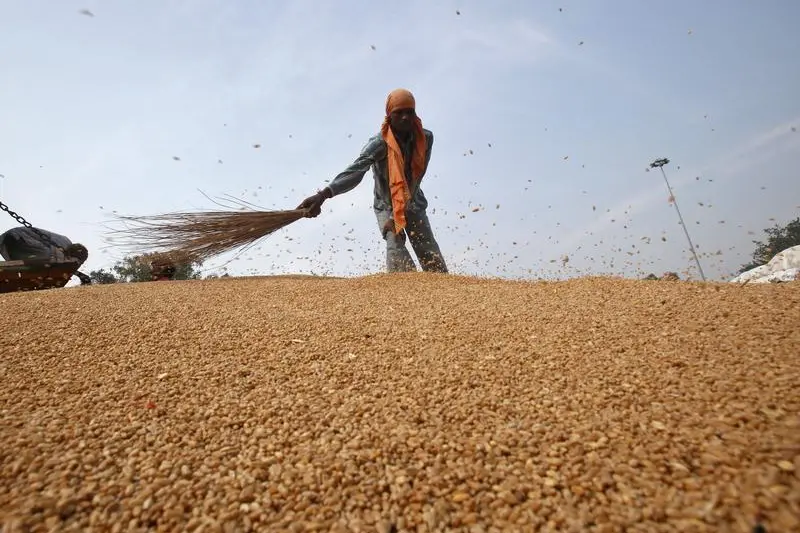PHOTO
* Move seen supporting domestic farmers
* Could also prevent imports being sold to the state in scheme
* Food imports allowed but financial sanctions have hit trade
(Adds detail from paragraph three)
By Michael Hogan
HAMBURG/DUBAI, July 22 (Reuters) - Iran has imposed import duties on wheat and barley, an Iranian government regulation document seen by Reuters on Wednesday showed, hurting hope for more trade after the country's historic nuclear deal.
The wheat duty is 1,500 rials per kilo, or about $45 to $50 a tonne, according to the document, a level that would render wheat imports commercially unfeasible, traders said.
"The import duty shows that Iran does not have a pressing import need and is in a relaxed enough supply position to support its farmers by reducing imports," one European trader said.
"It also indicates that large wheat import purchases are not to be expected from Iran following the big nuclear agreement."
Iran was never barred from buying food under Western sanctions over its disputed nuclear programme, but EU and U.S. sanctions have made trade more difficult by hindering payments and ocean shipping.
Iran agreed with world powers this week to curb its nuclear programme in return for the lifting of sanctions. Despite the deal, Iran is not expected to move back into world wheat markets quickly, with financial sanctions also expected to take some time to remove.
ID:nL5N0ZW3SC
The new wheat duty has been imposed for the next year and the barley duty until Sept. 22, 2015, the regulation seen by Reuters said.
"The duty will mean wheat imports are not worthwhile, except possibly for some Russian wheat," another trader said. "Wheat imports are likely in later months but are not seen as needed now."
Traders said the move was seen as an effort to protect Iranian farmers from cheap imports and to prevent imported grain being re-sold to the government at higher prices under the country's scheme of state purchases from farmers at guaranteed prices.
"The Iranians seem to have had a decent harvest and I think they have large wheat stocks following their import programme in the last year," one European trader said. "The move seems to indicate the desire to support farmers is greater than the need to undertake imports even though easier trading conditions are expected following the nuclear deal."
"Barley is likely to be imported sooner after the state purchasing period from farmers is over."
The import duties apply to all private sector importers, traders and mills, traders said.
But the duty does not apply to the state import agencies Government Trading Corporation of Iran (GTC) or the State Livestock Affairs Logistic Co (SLAL), the regulation said.
"Imported wheat is currently about $50 a tonne cheaper than the price Iranian farmers get from the government in its state purchasing programme," another trader said. "The duty will make it more worthwhile for Iranian flour mills to buy local wheat instead of making imports."
"There is also a lot of talk that some imported wheat has been resold into the Iranian government's farmer purchasing scheme at a profit."
(Reporting by Michael Hogan, Maha El Dahan, Bozorgmehr Sharafedin and Jonathan Saul; Editing by Peter Graff) ((michael.j.hogan@thomsonreuters.com; +49 40 419 03 4275; Reuters Messaging: michael.hogan.thomsonreuters.com@reuters.net))
* Could also prevent imports being sold to the state in scheme
* Food imports allowed but financial sanctions have hit trade
(Adds detail from paragraph three)
By Michael Hogan
HAMBURG/DUBAI, July 22 (Reuters) - Iran has imposed import duties on wheat and barley, an Iranian government regulation document seen by Reuters on Wednesday showed, hurting hope for more trade after the country's historic nuclear deal.
The wheat duty is 1,500 rials per kilo, or about $45 to $50 a tonne, according to the document, a level that would render wheat imports commercially unfeasible, traders said.
"The import duty shows that Iran does not have a pressing import need and is in a relaxed enough supply position to support its farmers by reducing imports," one European trader said.
"It also indicates that large wheat import purchases are not to be expected from Iran following the big nuclear agreement."
Iran was never barred from buying food under Western sanctions over its disputed nuclear programme, but EU and U.S. sanctions have made trade more difficult by hindering payments and ocean shipping.
Iran agreed with world powers this week to curb its nuclear programme in return for the lifting of sanctions. Despite the deal, Iran is not expected to move back into world wheat markets quickly, with financial sanctions also expected to take some time to remove.
The new wheat duty has been imposed for the next year and the barley duty until Sept. 22, 2015, the regulation seen by Reuters said.
"The duty will mean wheat imports are not worthwhile, except possibly for some Russian wheat," another trader said. "Wheat imports are likely in later months but are not seen as needed now."
Traders said the move was seen as an effort to protect Iranian farmers from cheap imports and to prevent imported grain being re-sold to the government at higher prices under the country's scheme of state purchases from farmers at guaranteed prices.
"The Iranians seem to have had a decent harvest and I think they have large wheat stocks following their import programme in the last year," one European trader said. "The move seems to indicate the desire to support farmers is greater than the need to undertake imports even though easier trading conditions are expected following the nuclear deal."
"Barley is likely to be imported sooner after the state purchasing period from farmers is over."
The import duties apply to all private sector importers, traders and mills, traders said.
But the duty does not apply to the state import agencies Government Trading Corporation of Iran (GTC) or the State Livestock Affairs Logistic Co (SLAL), the regulation said.
"Imported wheat is currently about $50 a tonne cheaper than the price Iranian farmers get from the government in its state purchasing programme," another trader said. "The duty will make it more worthwhile for Iranian flour mills to buy local wheat instead of making imports."
"There is also a lot of talk that some imported wheat has been resold into the Iranian government's farmer purchasing scheme at a profit."
(Reporting by Michael Hogan, Maha El Dahan, Bozorgmehr Sharafedin and Jonathan Saul; Editing by Peter Graff) ((michael.j.hogan@thomsonreuters.com; +49 40 419 03 4275; Reuters Messaging: michael.hogan.thomsonreuters.com@reuters.net))





















